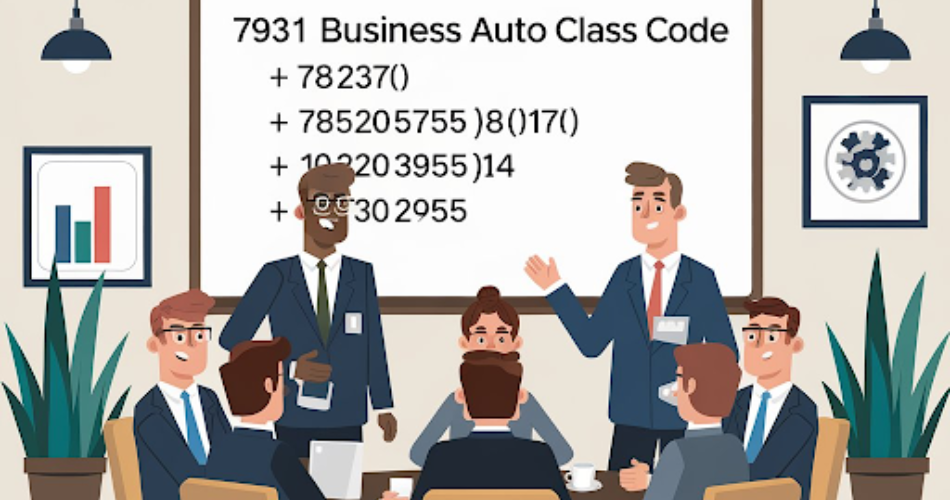Introduction
Navigating the complexities of business insurance can be overwhelming, especially if you’re unfamiliar with key classifications that affect your coverage and premium rates. For companies in the automobile industry, the 7931 Business Auto Class Code is particularly significant. This classification plays a crucial role in determining insurance costs and the scope of coverage for businesses like auto repair shops, car dealerships, body shops, and towing services.
In this comprehensive guide, we’ll break down the 7931 Business Auto Class Code, explain its importance, and explore how it impacts daily operations and financial planning for auto-related businesses. Additionally, we’ll clarify common misconceptions about this classification and offer actionable steps to ensure your business is properly categorized to avoid unnecessary costs and coverage issues.
What is the 7931 Business Auto Class Code?
The 7931 Business Auto Class Code is a specialized designation used by insurance providers to categorize businesses within the automotive sector, particularly when assessing risks related to workers’ compensation and liability insurance. This classification helps insurers understand the nature of a company’s operations, enabling them to gauge the specific hazards these businesses face.
Industries such as auto repair shops, vehicle dealerships, towing companies, and auto body repair facilities are typically assigned this classification. These industries inherently deal with various risks, from managing dangerous materials to using heavy equipment or encountering roadside hazards. Therefore, having the right insurance coverage is essential.
By using the 7931 Business Auto Class Code, insurance providers can determine premiums and design policies that accurately reflect the risks each business faces. For business owners, being aware of this classification ensures they receive the right coverage without overpaying.
The Importance of the 7931 Business Auto Class Code
Understanding the 7931 Business Auto Class Code is vital for determining insurance costs and the scope of coverage for businesses in the auto industry. This classification serves several purposes, making it essential for businesses to get it right. Here’s why it’s so important:
Accurate Risk Evaluation
One of the primary functions of the 7931 Business Auto Class Code is to help insurance providers assess the risk levels associated with different types of auto-related businesses. Each operation—whether it’s a towing service, auto repair shop, or vehicle dealership—faces unique risks. For example, towing companies may encounter roadside hazards and vehicle accidents, while auto body shops face dangers like handling hazardous materials or operating heavy machinery.
By categorizing businesses accurately, insurers can gauge the likelihood of claims, which directly impacts premiums. High-risk businesses, such as those with frequent exposure to accidents or dangerous equipment, tend to face higher premiums, while lower-risk businesses can enjoy reduced rates.
Tailored Insurance Solutions
Another benefit of the 7931 Business Auto Class Code is that it enables businesses to obtain customized insurance coverage. Instead of being locked into a one-size-fits-all policy, companies can receive coverage tailored to their unique risks. This ensures adequate protection without overpaying for unnecessary coverage.
For instance, an auto dealership might need specialized insurance for test-driving vehicles and protecting inventory, while an auto repair shop would require coverage that focuses on liability for repairs and worker safety. Tailored policies offer peace of mind by protecting businesses in the areas that matter most.
Ensuring Compliance with Regulations
Proper classification under the 7931 code is also vital for regulatory compliance. Misclassification could result in insufficient coverage, leaving businesses exposed to financial penalties, legal issues, or costly claims. Ensuring that your business is classified correctly helps you stay compliant with industry regulations and avoid potential legal and financial consequences.
Strategic Financial Planning
Understanding how the 7931 Business Auto Class Code influences insurance premiums is essential for strategic financial planning. Knowing the factors that affect premiums allows businesses to budget more effectively—especially smaller companies that need to manage their expenses carefully to maintain profitability.
By ensuring accurate classification, businesses can avoid unexpected premium increases and better plan for long-term insurance costs. This foresight helps maintain smooth financial operations and supports future growth.
How the 7931 Business Auto Class Code Influences Insurance Premiums
The 7931 Business Auto Class Code significantly impacts the cost of business auto insurance. Understanding how this classification affects premiums enables businesses to make informed decisions about their coverage needs. Here are the key ways this code influences premium rates and coverage options:
Risk-Based Premium Calculations
The 7931 Business Auto Class Code is instrumental in assessing the risks associated with a business’s operations. Companies with greater exposure to risk, such as those handling heavy machinery or performing high-risk tasks like welding, generally face higher premiums. For example, an auto repair shop that engages in complex mechanical work may incur higher costs than a car dealership that primarily focuses on sales.
Insurers also use this classification along with a business’s claims history to determine appropriate premium levels. Businesses with a higher likelihood of claims often face increased costs, while those with fewer incidents enjoy more favorable rates.
Tailored Coverage Based on Business Needs
The 7931 Business Auto Class Code doesn’t only impact premiums; it also shapes the type of insurance coverage offered. Businesses within the automotive industry often require customized policies to address their specific risk factors. For example, a towing company may need coverage for accidents and roadside assistance liability, while an auto repair shop might require enhanced workers’ compensation to protect employees working with dangerous tools or machinery.
By aligning coverage with a business’s operational risks, insurers can provide comprehensive protection without adding unnecessary extras.
Impact of Claims History on Premium Costs
A company’s claims history plays a critical role in determining insurance costs. Businesses that have filed frequent or expensive claims are generally considered higher risk, leading to increased premium rates. Insurance providers evaluate claims history alongside the 7931 classification to assess overall risk profiles.
Businesses with a clean claims record can enjoy reduced premiums and better coverage options, making it beneficial to maintain a minimal claims history.
Types of Businesses Covered Under the 7931 Business Auto Class Code
Several types of businesses within the automotive sector are typically classified under the 7931 Business Auto Class Code. Below are some examples:
Auto Repair Shops
Auto repair shops that offer services like engine repairs, oil changes, brake maintenance, and other essential vehicle services are often classified under the 7931 code. These operations deal with various risks, such as handling heavy machinery and hazardous substances. Insurance policies for these businesses are designed to address these unique risks.
Car Dealerships
Car dealerships that sell new and used vehicles, along with offering services like test drives and vehicle storage, are also covered under the 7931 code. Dealerships face specific risks, such as liability during test drives and managing inventory. Tailored insurance helps manage these risks effectively.
Auto Body Shops
Auto body shops, which specialize in collision repairs and vehicle repainting, are classified under the 7931 code. These businesses face risks such as working with damaged vehicles and handling welding and painting equipment. Specialized insurance is crucial for managing these hazards.
Towing Services
Towing companies that provide roadside assistance or vehicle recovery services are also covered by the 7931 Business Auto Class Code. Due to the nature of their work, which involves navigating road hazards and recovering vehicles, they require specialized insurance coverage to protect against potential liabilities.
Debunking Common Myths About the 7931 Business Auto Class Code
Despite its importance, the 7931 Business Auto Class Code is often misunderstood. Let’s dispel some common myths:
Misconception 1: All Auto Businesses Are Categorized the Same
Contrary to popular belief, not all automotive businesses are classified the same. Each business is evaluated based on its specific operations and risk profile. For instance, the risks faced by a towing service differ from those of a car dealership, and these differences are reflected in classifications and insurance premiums.
Misconception 2: A Higher Class Code Equals Higher Risk
A common misunderstanding is that a higher class code automatically indicates higher risk. In reality, class codes serve as tools for categorizing businesses based on their activities, not necessarily the level of risk. While class codes help insurers assess businesses, they are not a definitive measure of risk.
Misconception 3: Class Codes Never Change
Some believe that once a class code is assigned, it remains fixed. However, class codes can change over time due to evolving industry standards or changes in a business’s operations. Regularly reviewing your classification ensures it accurately reflects your current activities.
Ensuring Accurate Business Classification for Insurance Purposes
Accurate classification under the 7931 Business Auto Class Code is essential for obtaining the right insurance coverage. Misclassification can lead to inadequate protection or higher premiums. Here are tips to ensure proper classification:
Seek Guidance from Industry Experts: Working with an experienced insurance professional can help you navigate the complexities of business classification.
Regularly Assess and Update Your Classification: Periodically review your classification to ensure it reflects your current business activities.
Thoroughly Understand Your Business Activities: A clear understanding of your day-to-day operations helps you select the correct class code and avoid costly mistakes.
Conclusion: The Importance of the 7931 Business Auto Class Code
The 7931 Business Auto Class Code is a critical component for businesses within the automotive industry. It influences insurance premiums, coverage options, and overall risk assessment. By understanding and ensuring accurate classification, businesses can mitigate financial risks, secure the right insurance protection, and avoid overpaying for unnecessary coverage.
Keep up-to-date with breaking news and updates on Tanzohub.blog